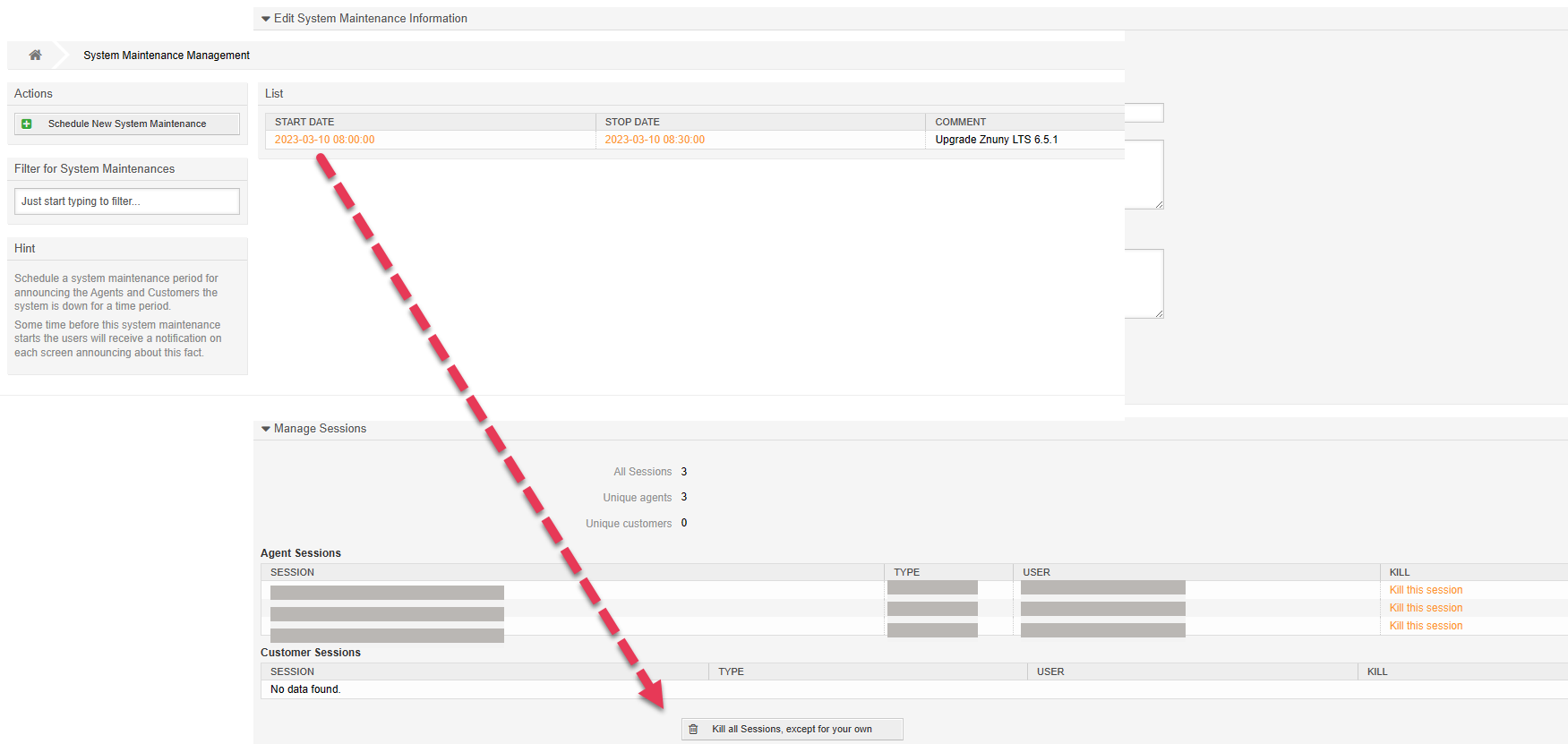Update to 6.5#
A Step-by-Step explanation on how to update to Znuny 6.5.
Important
Please make sure your current system is at the latest patchlevel version of 6.4
We do not support direct updates from any version of OTRS, ((OTRS)) Community Edition, Znuny LTS or before 6.4
For updates from OTRS, ((OTRS)) Community Edition, or Znuny LTS contact Znuny GmbH or the experts of your choice for assistance.
Preparations#
Before the update can started we need to perform some tasks to prepare the update.
You should or should have entered a scheduled maintenance time period in the admin area. Login as your admin user, select the active maintenance window and kill all sessions but your own. Now only administrators can login.

Maintenance Session Managment#
Create a backup of the database, the application and all data, especially the attachments.
Check if every add-on you are using is available for version 6.5.
Create a backup of the database, the application and all data, especially the attachments.
# Stop the webserver
systemctl stop httpd # CentOS / RHEL
systemctl stop apache2 # Debian / Ubuntu
# Stop your local MTA, mostly Postfix, sometimes Exim or Sendmail
systemctl stop postfix
# Remove crontab, stop daemon
su -c 'bin/Cron.sh stop' - otrs
su -c 'bin/otrs.Daemon.pl stop' - otrs
New Required Modules#
None
Update via RPM#
The update via RPM.
You can find the correct URL for your RPM at https://www.znuny.org/releases.
# Update to Znuny 6.5 (RHEL 7 / CentOS 7)
yum update -y https://download.znuny.org/releases/RPMS/rhel/7/znuny-6.5.15-01.noarch.rpm
# Check for missing modules and add required modules
/opt/otrs/bin/otrs.CheckModules.pl --all
Update via source#
The installation from source takes some more steps. If there are more file to restore than mentioned in the restore block, add them by yourself.
# Download latest Znuny 6.5
cd /opt
wget https://download.znuny.org/releases/znuny-latest-6.5.tar.gz
# Extract
tar xfz znuny-latest-6.5.tar.gz
# Set permissions
/opt/znuny-6.5.15/bin/otrs.SetPermissions.pl
# Restore Kernel/Config.pm, articles, etc.
cp -av /opt/otrs/Kernel/Config.pm /opt/znuny-6.5.15/Kernel/
mv /opt/otrs/var/article/* /opt/znuny-6.5.15/var/article/
# Restore dotfiles from the homedir to the new directory
for f in $(find -L /opt/otrs -maxdepth 1 -type f -name .\* -not -name \*.dist); do cp -av "$f" /opt/znuny-6.5.15/; done
# Restore modified and custom cron job
for f in $(find -L /opt/otrs/var/cron -maxdepth 1 -type f -name \* -not -name \*.dist); do cp -av "$f" /opt/znuny-6.5.15/var/cron/; done
# Delete the old symlink
rm /opt/otrs
# Create a symlink
ln -sf /opt/znuny-6.5.15 /opt/otrs
# Check for missing modules and add required modules
/opt/otrs/bin/otrs.CheckModules.pl --all
Execute the migration script#
su - otrs
scripts/MigrateToZnuny6_5.pl
Reinstall or Upgrade Add-ons (Packages)#
Note
Packages for earlier versions of Znuny LTS (6.0.x) or Znuny (>=6.1.x) might not be compatible with Znuny 6.5 and have to be updated. Please contact the vendor of the packages before upgrading if you have doubts.
If all packages are available online, you can use the console command for updating.
Note
UpgradeAll should only be performed, after your target version has been reached.
Note
UpgradeAll can fail, if repositories are not reachable or configured, versions for your framework are not available, or packages have been renamed. In this case, you should upgarde your packages manually via the commandline or by installing/updating them via the package manager.
su - otrs
bin/otrs.Console.pl Admin::Package::UpgradeAll
If the repository is not registered or available, download the package and update manually using the package manager, or command line.
You have two options:
Run the script, install the missing package using the package manager
> bin/otrs.Console.pl Admin::Package::Upgrade LOCATIONOFYOURPACKAGE
#or for renamed packages
> bin/otrs.Console.pl Admin::Package::Install LOCATIONOFYOURPACKAGE
Important
After reinstalling or updating packages, always run su -c ‘scripts/MigrateToZnuny6_5.pl –verbose’ - otrs
Restart everything#
# Fill the crontab and wait(!) at least 5 minutes that the Daemon is started via cron
su -c 'bin/Cron.sh start' - otrs
# Start the webserver
systemctl start httpd # CentOS / RHEL
systemctl start apache2 # Debian / Ubuntu
# Start your local MTA, mostly Postfix, sometimes Exim or Sendmail
systemctl start postfix
Deactivate maintenance#
Don’t forget to deactivate the scheduled maintenance, so that your users and customers can login again.
Post Update Changes#
None